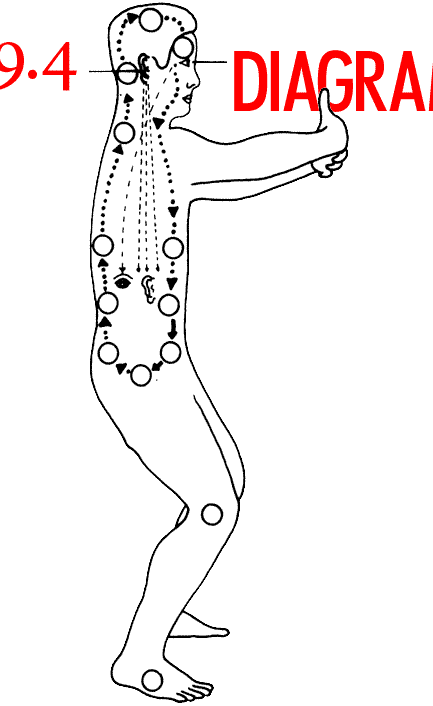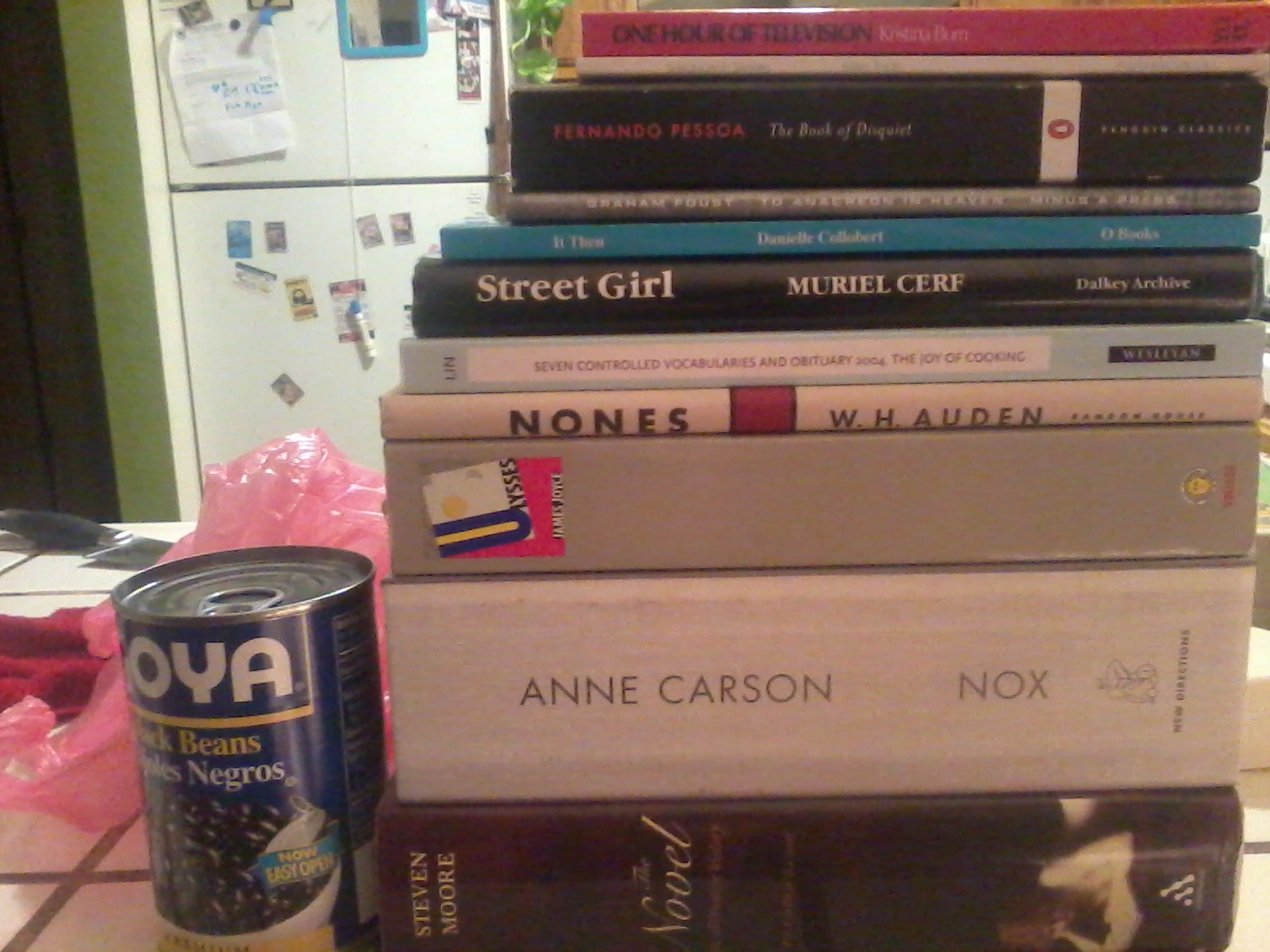Hill of Beans, Can of Words
These are some books I bought or otherwise acquired recently. A hill of words.
& that is a can of beans.
Ben Mirov
Ghost Machine
(not pictured)
Caketrain
Pittsburgh, PA — 2010
I read most of this book at the park that is in the book on a pretty much perfect day and it was a hell of a pairing I have to say. It has the kind of restraint my own work lacks a lot. Makes me jells but not bad way. Read the rest at my ex’s apartment who is no longer my ex while she made me dinner, which I could not believe was happening and yet there it was happening. I often felt breathless and thought maybe that’s not such a dumb name for a movie after all. READ MORE >
{Today} in Class: Micro-Reviews

So, for weeks now I’ve been promising excerpts reviews of contemporary poetry books and lit mags by students in my Deeper Poetics class. I’m consistently surprised and delighted by what they’re up to. Here are a few snippets:
Helena B. on Darcie Dennigan’s Corinna A-Maying the Apocalypse (Fordham U. Press, 2008)
Dennigan’s book doesn’t have anything so cheap as a moral. But in the crystalline strangeness and unfamiliar beauty of all of the poems; in the relationship between the poet and a young child (who may, in fact, be the child-self of the speaker herself) who each need the other desperately, and who agree to last; in the speaker’s wry and insistent and self-deprecating self-awareness (that can be found in nearly every poem but is most noticeable in “Eleven Thousand and One” and “Interior Ghazal of a Lousy Girl”) is some reassurance: that the world has already ended, that the world is always ending, and that we are still here. This is the kind of book that ruins me for doomsdays scenarios. May the ending of the world be half this beautiful.
Brandon V. on Lisa Jarnot’s Night Scenes (Flood Editions, 2008)
Lisa Jarnot’s Night Scenes begins with an epigraph out of Robert Duncan:
O, to release the first music somewhere again,
for a moment
to touch the design of the first melody!
Night Scenes is aptly preluded: sound and meter govern the poems in this collection. Jarnot pens the lyric—through implicit in the lyric poem is the myth of the proto-lyricist and first poet, Orpheus, and his songs of loss. Jarnot crafts scenes of sprawling fields and forests restful and bucolic and bathed in stars; these scenes, however, are as a dream, sung from a distance, projected like moonlight onto the page from Jarnot’s ostensible (as first seen in the poem “Bar Course Excise Insensible”) home in Brooklyn. Night Scenes is a searching, a reaching for that lost first music—and Jarnot takes up the task jubilantly, finding her melody in the wonder of the sensuous natural world.
November 9th, 2010 / 4:52 pm
Chris Higgs interviews Kristina Born for The Faster Times, about her new book One Hour of Television. [BORN: I wanted it to be suffocating. Gertrude Stein thought (mostly in reference to her plays, I believe) that you can’t write emotional arcs, because if the reader is not in the exact right emotional state at the right stage in the arc, you’ll lose him. Her solution was to put everything on the page immediately, like a painting, and allow the reader to pick out what resonated with him at the time. I’m interested in a different solution: a complete monopoly of mood. I want to try to write in a way where the reader can pick up the book, read any sentence, and be immediately crunched down into the mood he should be in.]
Kristina Born’s One Hour of Television
Year of the Liquidator, the press Shane Jones and I started earlier this year, will release its first title, Kristina Born’s One Hour of Television, on Halloween.
Designed to run as a series, the books, as we hopefully put out more, will form a continuum of design, like a little freakhouse on your nightstand.

People have already said nice things:
To read One Hour of Television is to flip channels between a 50’s science film on the joys of nuclear prowess and a heist-driven road movie set in a late-imperialist apocalypse. In Born’s hands, all social code is a recipe for deadpan horror. Strained domestic tableaus are intimately wedded to carpet bombings and crowd control, and our best chances at intimacy arrive via gruesome medical emergencies. This book is in revolt against language as an anesthesia machine. It’s in revolt against an empire in which any vote you cast necessarily ends up as a vote for genocide.
– Lara Glenum, author of Maximum GagaOne Hour of Television‘s recurring headwounds make an apt symbol for the work as a whole; urgent and insistent, the oozing gauze on an otherwise lovely skull. Would that all flash fiction be this deadly.
– Amelia Gray, author of AM/PM
You can read an excerpt and preorder One Hour of Television now for $10.
You can also add the book on Goodreads.
Thanks!
Diagram Summer All-Fiction Issue
 It’s one of the things I look forward to every year: Diagram’s badass and always mindbending gathering of finalists and winner of their annual $5 innovative fiction issue. The 2009 batch has just gone live, and this year marks another slew of things to stare at open in my web browser while I write my owns, including words by many new-to-me names: August Tarrier, Erica W. Adams, Michael Argest, Kristina Born, Micah Nathan, Lito Elio Porto, Nathania Rosenfeld, Rhodes Stevens, and Jenny Zhang.
It’s one of the things I look forward to every year: Diagram’s badass and always mindbending gathering of finalists and winner of their annual $5 innovative fiction issue. The 2009 batch has just gone live, and this year marks another slew of things to stare at open in my web browser while I write my owns, including words by many new-to-me names: August Tarrier, Erica W. Adams, Michael Argest, Kristina Born, Micah Nathan, Lito Elio Porto, Nathania Rosenfeld, Rhodes Stevens, and Jenny Zhang.
Big highlight for me is a new long-ish text from heartthrob Kristina Born (yes, Shane Jones and I are releasing her debut book later this year, take a look!). Check out this sample graph from this fine show of freak:
The Gilmore Commission
Holograms can kill a man. Unlike linear images, which are easily sidestepped, literally. A threadlike sports car races by the locked glass doors. Since early childhood, Jack Twig, it has been your job to know the difference. (You said: the difference is it’s a psychological difference.) Mother and I have been losing our sight for quite some time. Even now, Teddy proposes a game of hangman and she declines, murmuring, patting her hands on her cheeks. Look at her. She is not afraid to die but of almost every other thing. Sometimes I wonder, Who can think without horror on death and the life beyond? and I know it is only my wife and only because her eyeballs are falling out. Sometimes I wonder, When comes the mutually assured destruction promised us by our greatest nations? Jack Twig, take a look for me: I think I still have some extremely deteriorated nerve agent buried in the yard.
I XOX her to death. Read the rest of this brilliant piece: Jack Twig is the Evil Pulse of Canada.
The rest is all as grand as well and a big gleam. Diagram continues to be, to me, one of, if not THE, best web journal around.
August 31st, 2009 / 12:57 pm

